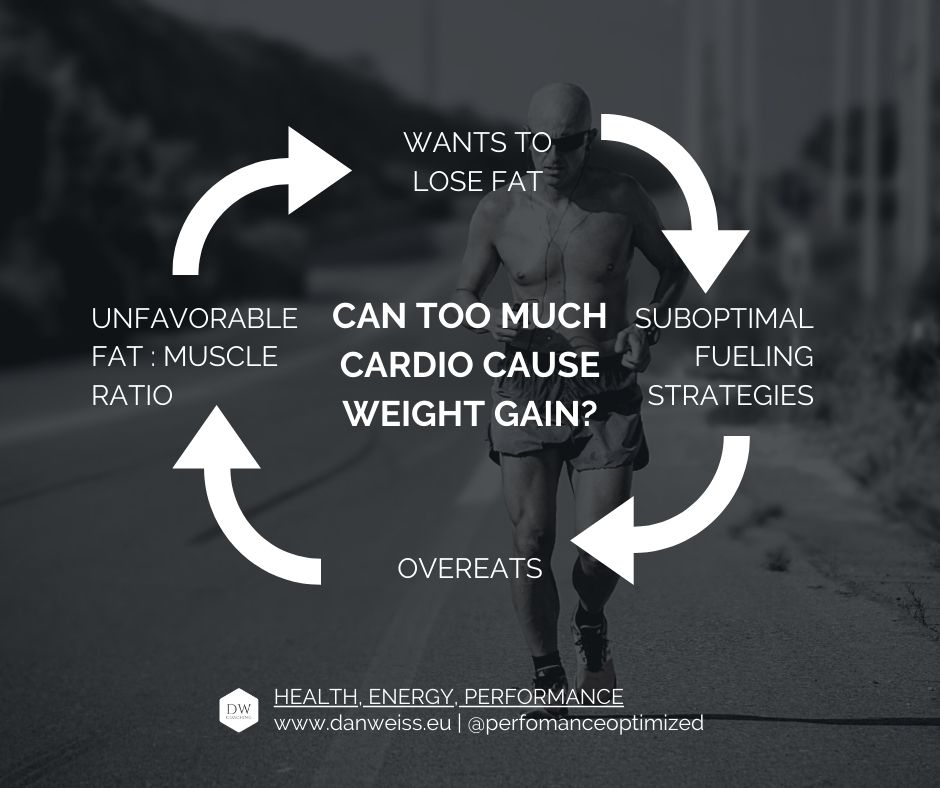You want to lose belly fat and so you start with running. You enjoy it so much you start training for a marathon. You lost a few pounds initially, but you don’t anymore despite training more. Can too much cardio cause weight gain?
Now you start wondering what could be wrong, until your google search leads you to claims, that cardio causes fat gain. I have seen claims that cardio causes fat gain many times.
The argument is that cardio causes weight gain, because when you do cardio often, your body produces excessive cortisol (stress hormone) which leads to accumulation of fat around your waist and muscle breakdown. Therefore the more cardio you do, the worse it gets.
At first, It sounded logical to me because I see quite a lot of runners struggle with this. Even I encountered this problem when I started with running. The more I run, the less satisfied with how my body looked I was.
But then I started researching this topic I came to different conclusion.
When we look at elite runners, they don’t have much fat anywhere and they run much more than me and probably more than you.
I am not going to break down cortisol here but here is the least you need to know.
Cortisol, as a stress hormone allows release of energy. It follows a natural pattern, for example cortisol is elevated in the morning and helps us to wake up. Problem is if cortisol is chronically elevated, which leads to blood sugar disregulation and adipose tissue accumulation. We can see that in athletes over-train and don’t fuel adequately.
I fee like the more I run the more fat I am and less satisfied I am with how my body looks.
So why are there runners who train for marathons or half marathons with less than ideal body composition and a flabby tummy?
Based on my observation, research and experience, it is a combination of lifestyle and nutrition.
Here are the common traits among runners who struggle to lose the belly pouch:
-
They have stressful life
-
They have sedentary jobs and low activity outside of the running training
-
Their fueling strategies are sub-optimal at best. A typical example is runner who wants to lose belly fat. He resolves to fasting or other diet fad, which puts their body in a catabolic state. That leads to excessive muscle breakdown & increased hunger, followed by overeating. As a result, runner ends up with more fat mass and less muscle mass.
-
Lack of strength training
As you can see ,it is a simple calories in calories out equation, not a hormonal disregulation. By the way, when you eat, your cortisol goes down.

What can you do to break the cycle?
-
Watch your energy intake and expenditure. Here comes another issue. Even if you watch your intake and expenditure, your numbers don’t add up.
-
If according to numbers you are in deficit and still not losing weight, by definition, you are not in deficit! You just think you are because you believe the numbers. Keep caloric intake and expenditure as a guide, not as a goal.
-
Your body adapts and gets more efficient with movements you do often, therefore it gets more efficient with expenditure.
-
Fitness trackers don’t reliably measure your expenditure, most often overestimate it by 50-100%.
-
- Include strength training , which will help you to retain/build muscle and with runners related injuries.
- Stop with diet fads and start with smart nutrition and fueling strategies.
